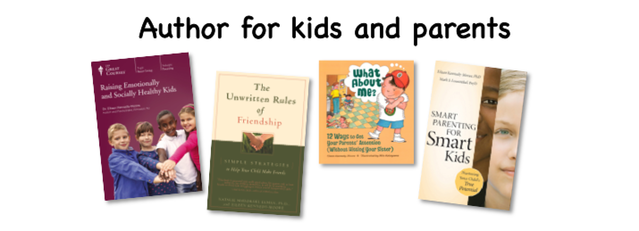Some friendships are toxic. The on-again-off-again friendship—or “frenemy” relationship—is one of these. One day your child is happy and excited and having so much fun with this friend; the next day he or she comes home emotionally bleeding from the friend’s vicious attacks.
If you’ve witnessed this scenario, you’ve probably told your child, “Stay away! This is not a healthy friendship!” But somehow your child keeps going back.
Minor tiffs are common in children’s friendships and not a cause for concern. If the power balance seems about equal between the friends, minor conflicts can be an opportunity for learning. If kids want to keep their friends, they need to figure out how to compromise and how to try again after a disagreement.
If your child seems to have a lot of minor squabbles with friends, you may want to have a talk about ways to solve conflicts other than just insisting on their way—like asking questions to understand the other child’s perspective, taking turns, suggesting a third alternative, and sometimes—as an act of kindness—just giving in and doing what the friend wants.
Enter the Frenemy
But research by Patricia Hawley at the University of Kansas and her colleagues points to a more dangerous type of relationship—friendship involving bistrategic controllers. These children are both very kind and very aggressive, especially to their friends, and they cleverly wield both strategies to enhance their social dominance. Bistrategic controllers are skilled at understanding other people’s perspectives, but they use this knowledge to lie, argue, and manipulate in aggressive, self-promoting ways. Bistrategic children dole out enough kindness—to the right people at the right times—to keep them hooked, and enough meanness--to the right people at the right times—to maintain or enhance their social status and keep others off balance.
Hawley has observed this bistrategic pattern, in increasingly sophisticated forms, in children from preschool through adolescence. Kids of all ages seem to be drawn to these socially powerful but strategically unkind children. Bistrategic children are fun, exciting, and popular, but they’re also risky, because they can ruthlessly turn on their friends when it suits their interests.
What can you do if your child is involved with a bistrategic frenemy? Here are some possibilities:
- Point out the pattern. Kids tend to live in the moment, so your child may need your help to recognize that this friend is sometimes nice and sometimes mean. If possible, try to point out this pattern related to someone other than your child. Gentle questions will work better than impassioned sermons. For instance, you could ask something like, “What have you noticed about how Cara treats Phoebe? What do you think that feels like for Phoebe? Why do you think Phoebe keeps trying to be friends with Cara?” You can also warn your child that if Cara talks meanly about Phoebe behind her back, she could very well being doing the same thing to other people—including them.
- Prepare your child to speak up effectively when needed. Just telling your child, “Don’t be friends with him,” is unlikely to work, because the bistrategic kids are often at the center of the fun. But you can prepare your child to handle mean gestures. Bistrategic kids are socially savvy, so they tend to target vulnerable children. Being able to speak up confidently can make your child less of a target.
If the bistrategic frenemy is being kind, it’s okay for your child to hang out with her. But if the frenemy being mean to your child, your child needs to call her on it and then walk away if necessary. For example, if the frenemy makes a mean comment to your child, your child can say in a calm but loud, carrying voice, “That was a mean thing to say.” Then walk away. Few children want to be publicly labeled mean. If the frenemy sets up a game where your child always has the worst role, you child could say calmly, “This isn’t fun for me.” If nothing changes, your child should walk away.
- Offer other friendship alternatives. Sometimes kids tolerate abuse from bistrategic frenemies because they believe they don’t have alternatives. With younger children, you can arrange play dates with kinder kids. With older children, you may be able to guide them toward outside activities that don’t involve the frenemy and that could lead to healthier friendships. Having another circle of friends can be very comforting to children when they hit a rough spot with their school friends.
- Talk about values. In some sense, bistrategic controllers are social virtuosos. But treating others with cruelty is just plain wrong. Talk with your child about what real friendship means. Most kids mention loyalty and kindness—qualities that frenemies show inconsistently. Encourage your child to reflect on how he feels when he’s with a friend who runs hot and cold versus a steady warm friend. You can also share your belief that being a steady warm friend is the right thing to do.
__
Related posts:
Make New Friends But Keep the Old…Or Not
© Eileen Kennedy-Moore, PhD. Google+
Eileen Kennedy-Moore, PhD, is an author and clinical psychologist in Princeton, NJ (lic. # 35SI00425400). She frequently speaks at schools and conferences about parenting and children’s social and emotional development. www.EileenKennedyMoore.com
Subscribe to Dr. Kennedy-Moore’s monthly newsletter to be notified about new posts on the Growing Friendships blog.

Dr. Kennedy-Moore's books and videos:
-- Have you ever wanted a parenting course you could do at YOUR convenience? Check out this fun and fascinating audio/video series on children’s feelings and friendships from The Great Courses®: Raising Emotionally and Socially Healthy Kids. || Topics include: Teaching Kids to Care; Developing Genuine Self-Esteem; How Kids Manage Anxiety and Anger; Playing Well With Others; Growing Up Social in the Digital Age. VIDEO preview.
On sale 70% off at: www.TheGreatCourses.com/Kids
-- Smart Parenting for Smart Kids: Nurturing Your Child's True Potential || Chapters include: Tempering Perfectionism; Building Connection; Developing Motivation; Finding Joy. VIDEO preview.
-- The Unwritten Rules of Friendship: Simple Strategies to Help Your Child Make Friends || Chapters include: The Shy Child; The Little Adult; The Short-Fused Child; The Different Drummer.
-- What About Me? 12 Ways To Get Your Parents' Attention Without Hitting Your Sister. VIDEO preview.
Growing Friendships blog posts are for general educational purposes only. They may or may not be relevant for your particular situation. You’re welcome to link to this post, but please don’t reproduce it without written permission from the author.
Photo credit: “drip” by Matt MacGillivray / CC BY 2.0
For further reading: Hawley, P. H. & Geldhof, G. J. (2012). Preschoolers’ social dominance, moral cognition, and moral behavior: An evolutionary perspective. Journal of Experimental Child Psychology, 112, 18-35.
Hawley, P. H., Little, T. D., & Card, N. A. (2007). The allure of a mean friend: Relationship quality and processes of adolescents with prosocial skills. International Journal of Behavioral Development, 31, 170-180.





